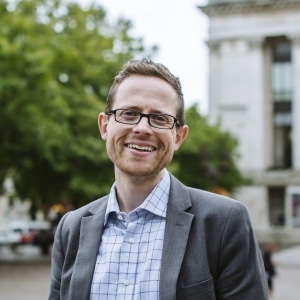I studied a PhD in Neuroscience. I was lucky enough to study at the University of Cambridge, UK. The PhD was about the effects of temperature on the nerve-muscle interface and behavioural coordination.

I now have a number of roles and responsibilities. My research is in urology which sounds like a huge jump from my PhD but isn’t. We still use many of the same approaches but apply them to the clinical problem of why so many people suffer impactful urinary symptoms.
After my PhD I project managed the 2004 Royal institution Christmas Lectures. I co-wrote scripts, designed models that demonstrated scientific principles and got to work with some amazing people – including the guy that made Jabba the Hutt for the Star Wars films. Seeing what we’d created being broadcast on television was a surreal experience! I then began a series of post-docs in the UK and USA. I got independent research funding in 2010 and have been managing a research group since then. I lecture students across a number of disciplines (biomedical science, pharmacology, pharmacy and nursing) and train junior researchers. I’m an Associate (deputy) Head of School and acting Director for a large research institute – which basically translates to trying to help others progress their research and be given the opportunities that I’ve been lucky enough to have had.

I learned a huge amount by doing a PhD. In addition to specific scientific skills, I also learned important skills in project management (such as time and resource management) and science communication. Doing a PhD is very hard, so you learn a huge amount about yourself, too.
How all this has helped my career is difficult to say but most PhD students learn quickly that they need to be independent, use their initiative and have a positive, problem-solving mindset. This all lends itself well to leading a research group, as I do now.
Networks! They provide support and opportunities for collaboration. Twitter is just fantastic for engaging with appropriate networks – whether that’s virtual journal clubs, other PhD students, discipline-related groups, etc. For me it’s also about maintaining constant engagement with patients and carers – who drive our research.

Follow him on Twitter using the link below:

